NBC POLL Do you believe in God? NBC this morning had a poll on this question. They had the highest Number of responses that they have ever had for one of their polls, and the Percentage was the. Poll: Oh My God! A poll by uchihasasuke20. Which of these movies with the word 'God' in the title (rated 5.0 or higher with more than 1,000 votes on IMDb) is your favorite? Discuss the list here. Hermes, the god of tricksters, shepherds, liars, inventors, thieves, and travelers, has a permanent place in my heart. However, Dionysus has usurped his place as my favorite. While Apollo is the god of reason and order, Dionysus is his antithesis as the god of chaos, the. Plan the time to have your meeting or event by co-ordinating availability with all the particpants using this fuss-free online tool.
In recent years, the share of American adults who do not affiliate with a religious group has risen dramatically. In spite of this trend, the overwhelming majority of Americans, including a majority of the religiously unaffiliated – those who describe themselves, religiously, as atheists, agnostics or “nothing in particular” – say they believe in God or a higher power, according a new Pew Research Center survey conducted in December of 2017. At the same time, only a slim majority of Americans now believe in the God of the Bible and roughly one-in-ten U.S. adults don’t believe in any higher power or spiritual force.
Here are six key takeaways from the report:
1The vast majority of Americans (90%) believe in some kind of higher power, with 56% professing faith in God as described in the Bible and another 33% saying they believe in another type of higher power or spiritual force. Only one-in-ten Americans say they don’t believe in God or a higher power of any kind.

2In the U.S.,Christians are particularly likely (99%) to believe in God or a higher power, with 80% claiming faith in a biblical God. Three-quarters of Christians describe God as all-loving, all-knowing and all-powerful. Like Christians, most Jews (89%) have faith in a deity. But just a third of Jews (33%) say they believe in God as described in the Bible, while 56% say they believe in some other higher power. Jews are also more likely than Christians to say they don’t believe in a spiritual force of any kind (10% vs. 1%). Finally, among those who describe themselves as religiously unaffiliated – also known as “nones” – 72% say they believe in a higher power of some kind.
3About half (48%) of U.S. adults believe God determines what happens to them most or all of the time. Nearly eight-in-ten U.S. adults think God or a higher power has protected them, and two-thirds of Americans say they have been rewarded by the Almighty. At the same time, fewer see God as judgmental and punitive, with just four-in-ten saying they have been punished by the deity in which they believe.
4Younger adults (those under the age of 50) are less inclined than older Americans to believe in a biblical God and more likely to say they don’t believe in any higher power or spiritual force. While roughly two-thirds of older adults say they believe in the biblical God, just 49% of those in their 30s and 40s – and just 43% of adults under 30 – say the same. Even with this age gap, an overwhelming majority of the youngest adults continue to believe in God or a higher power: Eight-in-ten of those ages 18 to 29 say they believe in at least some kind of spiritual force. Youtube downloader for mac x.
5Americans with a high school education or less are more likely than college graduates to believe in God or a higher power (94% vs. 84%). They also are more likely than those who graduated from college to believe in the God of the Bible (66% vs. 45%) and to believe that a higher power determines what happens in their lives most or all of the time (59% vs. 33%).
6Republicans and Democrats have very different beliefs about God. Democrats and those who lean toward the Democratic Party are less likely to say they believe in the God of the Bible than Republicans and Republican leaners (45% vs. 70%). Democrats are more likely than Republicans (39% vs. 23%) to say they believe in a higher power other than the biblical God. They also are more likely to say they don’t believe in any deity at all (14% vs. 5%). The survey also finds big racial differences among Democrats; most nonwhite Democrats – who are predominantly black or Hispanic – believe in God as described in the Bible (61%), compared to just 32% of white Democrats.
Fox News Flash top headlines for May 15
Fox News Flash top headlines are here. Check out what's clicking on Foxnews.com.
Get all the latest news on coronavirus and more delivered daily to your inbox. Sign up here.
The coronavirus has prompted almost two-thirds of American believers of all faiths to feel that God is telling humanity to change how it lives, a new poll finds.
While the virus rattles the globe, causing economic hardship for millions and killing more than 80,000 Americans, the findings of the poll by the University of Chicago Divinity School and The Associated Press-NORC Center for Public Affairs Research indicate that people may also be searching for deeper meaning in the devastating outbreak.

A UChicago Divinity School/AP-NORC poll shows about a quarter of Americans say the coronavirus pandemic has strengthened their faith, even as a majority say it has not had an impact. ;


Even some who don’t affiliate with organized religion, such as Lance Dejesus of Dallastown, Pa., saw a possible bigger message in the virus.
“It could be a sign, like ‘hey, get your act together’ – I don’t know,” said Dejesus, 52, who said he believes in God but doesn’t consider himself religious. “It just seems like everything was going in an OK direction and all of a sudden you get this coronavirus thing that happens, pops out of nowhere.”
The poll found that 31% of Americans who believe in God feel strongly that the virus is a sign of God telling humanity to change, with the same number feeling that somewhat. Graphics card for a mac. Evangelical Protestants are more likely than others to believe that strongly, at 43%, compared with 28% of Catholics and mainline Protestants.
The question was asked of all Americans who said they believe in God, without specifying a specific faith. The survey did not have a sample size large enough to report on the opinions of religious faiths with smaller numbers of U.S. adherents, including Muslims and Jews.
In addition, black Americans were more likely than those of other racial backgrounds to say they feel the virus is a sign God wants humanity to change, regardless of education, income or gender. Forty-seven percent say they feel that strongly, compared with 37% of Latino and 27% of white Americans.
The COVID-19 virus has disproportionately walloped black Americans, exposing societal inequality that has left minorities more vulnerable and heightening concern that the risks they face are getting ignored by a push to reopen the U.S. economy. Amid that stark reality, the poll found black Americans who believe in God are more likely than others to say they have felt doubt about God’s existence as a result of the virus — 27% said that, compared with 13% of Latinos and 11% of white Americans.
But the virus has prompted negligible change in Americans’ overall belief in God, with 2% saying they believe in God today, but did not before. Fewer than 1% say they do not believe in God today but did before.
God's Villa Pollachi
Most houses of worship stopped in-person services to help protect public health as the virus began spreading, but that didn’t stop religious Americans from turning to online and drive-in gatherings to express their faiths. Americans with a religious affiliation are regularly engaging in private prayer during the pandemic, with 57% saying they do so at least weekly since March — about the same share that say they prayed as regularly last year.
Overall, 82% of Americans say they believe in God, and 26% of Americans say their sense of faith or spirituality has grown stronger as a result of the outbreak. Just 1% say it has weakened.
Kathryn Lofton, a professor of religious studies at Yale University, interpreted the high number of Americans perceiving the virus as a message from God about change as an expression of “fear that if we don’t change, this misery will continue.”
“When people get asked about God, they often interpret it immediately as power,” said Lofton, who collaborated with researchers from the University of Chicago and other universities, along with The Associated Press, on the design of the new poll. “And they answer the question saying, ‘Here’s where the power is to change the thing I experience.’”
Fifty-five percent of American believers say they feel at least somewhat that God will protect them from being infected. Evangelical Protestants are more likely than those of other religious backgrounds to say they believe that, with 43% saying so strongly and another 30% saying so somewhat, while Catholics and mainline Protestants are more closely split on feeling that way or not.

However, the degree and nature of protection that God is believed to offer during the pandemic can differ depending on the believer. Marcia Howl, 73, a Methodist and granddaughter of a minister, said she feels God’s protection but not certainty that it would save her from the virus.
“I believe he has protected me in the past, that he has a plan for us,” said Howl, of Portalas, N.M. “I don’t know what’s in his plan, but I believe his presence is here looking after me. Whether I can survive it or not, that’s a different story.”
Among black Americans who believe in God, 49% say they feel strongly that God will protect them from the virus, compared with 34% of Latino and 20% of white Americans.
David Emmanuel Goatley, a professor at Duke University’s divinity school who was not involved with the survey, said religious black Americans’ view of godly protection could convey “confidence or hope that God is able to provide -- that does not relinquish personal responsibility, but it says God is able.”
Goatley, who directs the school’s Office of Black Church Studies, noted a potential distinction between how religious black Americans and religious white Americans might see their protective relationship with God.
Their Eyes Were Watching God Pollen
Within black Christian theology is a sense of connection to the divine in which “God is personally engaged and God is present,” he said. That belief, he added, is “different from a number of white Christians, evangelical and not, who would have a theology that’s more a private relationship with God.” Tvairbooking.
